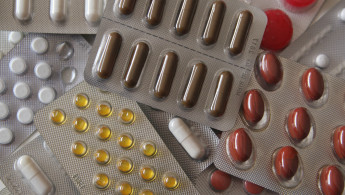Alternative medicines pose health risks in war-torn Syria
The breakdown of national health services and medical infrastructures in Syria, particularly in the north of the country, has lead to an increase in people seeking traditional herbal treatments and “alternate medicines”.
According to economics magazine Iqtisad, increased use of such medications has raised the risk of disease and death, especially when not practiced by experts.
Examples of treatments used include mixtures of natural herbs with honey for a range of ailments, tree bark for antibacterial, urinary infections and rheumatism, flowers and fruits for conditions including hypertension, headaches, atherosclerosis, and even allegedly camel milk for breast cancer.
Health risks
Speaking to Iqtisad, Dr. Ahmed al-Jirk, head of surgery in the Maarat National Hospital said that he treated two to three patients a month with complications resulting from herbal treatment including some with advanced cancer due to delays in diagnosis.
He said this was in part due to the seeking of alternative therapies reliant on the use of herbal remedies. Al-Jirk also noted that herbal treatments were also used in attempts to treat cases of arthritis and psoriasis.
Another medical practitioner interviewed by Iqtisad, Dr. Ahmed Dadoush, a dermatologist, noted that while herbal treatment had been used by people in Syria for generations, reductions in the number of staff in the country due to conflict and a corresponding lack of medical oversight had lead to its practice by people lacking expertise who were often unaware of the side effects of some of the plants they were using in their treatments.
For example, noted Dadoush, the use of the wrong herbal remedies to treat certain medical conditions, such as the skin condition Leishmania, could lead to the deepening of pre-existing scars and skin deformation.
Decimated medical infrastructure
In 2014 al-Sharq al-Awsat reported that the al-Buzuriyah souq, a traditional market in Damascus’ walled Old City had witnessed an upsurge in activity as locals increasingly returned to the market to purchase traditional preparations in order to save on medical costs.
As conflict has decimated Syria’s health and medical infrastructure, access to life-saving medication has become increasingly difficult.
Before civil war erupted in 2011, the Syrian medical system was once regarded as a model for the Arab world, with Syria also the second largest producer of pharmaceuticals in the region. But since several of Syria’s major pharmaceutical companies are located in battle zones, some factories have been destroyed and the imports of some drugs have skyrocketed, while others have become near impossible to find.
Illegal drug trade on the rise
Whilst medicinal drugs have become harder to come by and afford in Syria due to conflict, the pro-regime Al-Watan newspaper has reported that breakdowns in rule of law in the war-torn country have allowed drug dealers to establish networks in many provinces.
In a statement to Al-Watan earlier this week Ahmed al-Bakri, the chairman of Syria's criminal chamber of the court of cassation, said that in one case last month authorities had made a seizure of 10kg of hashish and 15,000 pills of the amphetamine captagon in one bust.
"The dealers are using the current circumstances and the preoccupation of the competent authorities to promote their poisonous materials," said Bakri to the pro-regime daily.


![Minnesota Tim Walz is working to court Muslim voters. [Getty]](/sites/default/files/styles/image_684x385/public/2169747529.jpeg?h=a5f2f23a&itok=b63Wif2V)






